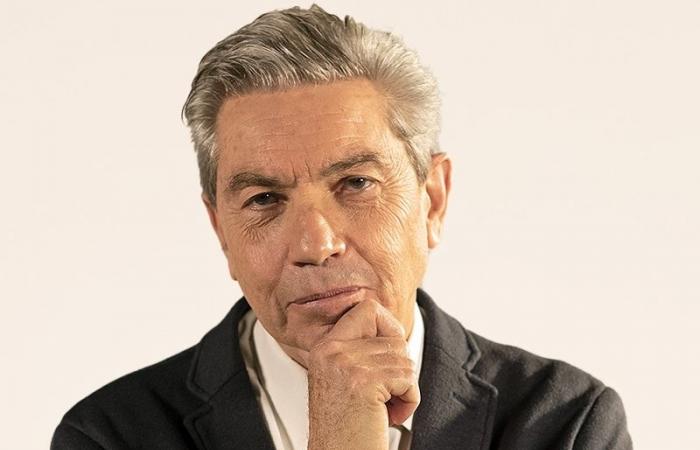“Now, before leaving, you will find a stand… of the CGIL to sign the referendum on the Jobs Act” conclude Mimmo Minute. At which point Antonio Padellaro grabs the microphone he just left and replies: “But no, I thought you were talking about the banquet to buy my book!”. And it wasn’t the first time, during the evening at the Malibù chalet in San Benedetto del Tronto organized by Libri ed Eventi and Il club degli incorriggibili ottimisti. Various ironic references to the purchase of the book and in general to not wanting to reveal too much of its content so as not to make reading it superfluous. Everything becomes clearer for those who, like me, have reached the conclusion of the short book, in particular with chapter 12, graphically entitled “Editorial Misfortunes”.
But let’s take a step back, who is Antonio Padellaro? As soon as I saw that he was coming to present his latest book, “Solo la verità, lo giuro”, I ran, after all I have been a subscriber to Il Fatto since well before it came out on newsstands, and like me many others have attended, but… most of them decidedly advanced in years. So, here is a short biography.
Italian journalist and essayist. In 1968 he became a professional journalist at ANSA. He worked at Corriere della Sera from 1971 to 1990 as editor, correspondent and head of the Rome editorial office. In 1990 he moved toEspresso as deputy director. In 2001 he participated in the refoundation of theUnit which he directed from 2005 to 2008. From 2009 to 2015 he was the first director of Daily factwhich he helped found. And of which he is currently an editorialist.
The back straight. This is the true essential characteristic of a good journalist, according to Padellaro. And it became the guiding thread of his speech. “You have to feel that you represent the readers of that newspaper, there is a whole world that trusts you.”. And, after all, doing journalism “it means making choices. I’m not a martyr, not in the slightest, but when Craxi made it impossible for me to work I left and arrived at L’Espresso. Or when I was at L’Unità and they asked me to get rid of Travaglio, and so on”.
Humanity. It’s important “on one hand never have any inferiority complex towards the person in front of you, but on the other hand respect for people is fundamental. Behind our stories there are people, in flesh and blood, with pain, shame, weaknesses…”. In this regard he cites the story of Raul Gardini, the entrepreneur who committed suicide following his involvement in the Enimont affair during Tangentopoli, to whom the book dedicates a short chapter with a very touching testimony. Or the story of Francesca Pascale, Silvio Berlusconi’s partner at the time, about whom he did not publish intimate details that would have delighted gossip enthusiasts (and consequently increased sales of Il Fatto).
Money. And then, Padellaro strongly emphasizes, “having your accounts in order is essential, otherwise you become prey to economic powers that take over you easily. Look at the information hub that the Angeluccis, entrepreneurs of private healthcare, have built, and that’s just one example!”. And then he gives the example of Repubblica, with the Elkanns: “Those who have the funds want to own the media to have weight”.
Journalism in the past was different. “I lived through the 70s, the 80s… there were big names, who wrote pieces that were true literature (today it’s not like that, a bit like today’s national football team is not like those of yesterday). I think of Giorgio Bocca, Eugenio Scalfari, Gianpaolo Pansa and many others. Pansa with his Bestiario in L’Espresso made politics tremble every time, thanks to his authority and brilliance”. Our profession “It requires sacrifice, a lot – and the new recruits must be ready for this – but if it is done with passion you don’t feel the weight”.
Occult powers have always been there. “Power always tries to influence journalism and it is obvious. The problem, in Italian history, has been the occult powers. Yesterday they were there and we discovered them at the end, I think of P2. Today there will certainly be other forms, different and perhaps not at that level of pervasiveness”. The anecdote, in this case, is when Padellaro himself in an editorial meeting at Corriere, with the director from Milan on speakerphone, asked: “But who is on the P2 lists?” which had just been revealed to the public… replied: “Actually, you’re there too”. Silence and then: “Publish everything” and the resignations would arrive in the afternoon.
This was just a taste of more than fifty years of journalism, of scoops and related behind-the-scenes stories, of autobiographical memories, of portraits of powerful or eccentric characters who have followed one another, of ‘masters’ and lifelong friends. It is a sincere book, which does not spare anyone, much less the author himself, an intimate diary made of confessions, reflections and revelations, with a good dose of irony (and self-irony).
An irony that he does not lack even in answering a provocative question from the public: “Padellaro, you are prima donnas, always on television. Enough, I’ve been waiting for a long time to vent!”. “But I’m not a woman! And in any case journalism is done everywhere, if then we want to criticize those television containers where everyone has to play a part, where the clash between caricatures is sought… we agree, they are not useful nor do I like them”.
Public comments. “I feel like calling him Antonio, he really seemed like one of the family. Read, seen and listened to on television so much… but above all this way of his, so easy-going, direct, human, stately…”.



